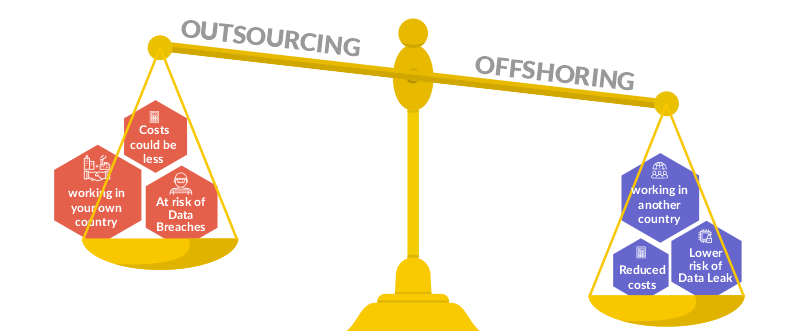Topics:
Offshoring vs. Outsourcing: A synonym check could save your business
Posted on August 23, 2019
Written By QX Global Group

As I delve deeper in my sales career, I grow increasingly uneasy with all the semantic slippage surrounding the terms, outsourcing and offshoring: in think pieces, headlines, sales calls, social media posts or glossy company brochures – people use it interchangeably, in abundance, without acknowledging the gulf between them.
I think a lot of accounting firms are borrowing the rhetoric of pop culture references and political speeches on outsourcing these days. However, for every sales call that I spend on explaining the difference between the two models – I grasp the extent to which their misuse of the word could be keeping them away from choosing the right strategic asset for their firm.
One way to draw a line between them would be by revisiting the roots – the definitions.
Outsourcing suggests that you are handing out a discrete process or task to an outsourcing company or professional to perform for you. It could be either in your own or another country.
And contrary to how pop culture usually clumps them together – Offshoring is your work that is being done offshore by someone on your own team: an employee or contractor who works for you. These employees are a part of your team and they do work your way, using your systems but they just happen to be in another location. It’s just like outsourcing but instead of someone working down the street, you will have a team working in a different country.
Definitions don’t quite last with us for long so I’d like to dig deeper into all the popular offshoring models that currently exist in the UK accounting industry:
Independent Accountants in India – an untapped talent pool or a bunch of amateurs?
They are mostly freelancers and independent contractors who typically work from home. There are no middlemen involved in this model which means as an accounting firm, you will be able to directly pay them. Eliminating middlemen also means that are less expensive and have fewer red tapes around the initial set up and processing of data.
However, the complexities in choosing the right accountant often outweighs the simplicity in the transaction process. Some say freelance accountants are a giant pool of untapped resources but for the others, they are a hoax: unqualified, unsuitable candidates whose credibility at processing back-office work cannot be vetted that easily. Moreover, most individual accountants would not have access to data-secure environment and would end up working on platforms Google Drive or Dropbox, leaving your client’s data vulnerable to hacking or data theft.
Scouting through freelancing websites like Truelancer or Upwork would tell that they are littered with spam prospects and data thieves.
One way to find a trusted freelancer accountant is to go digging into your accounting network; so that your peers in the industry can vouch for their reputation. But even if you find the right candidate, you are ensuring the safety of your client’s data in their hand could be purely based on word-of-mouth and trust.
Offshore Outsourcing Companies – A little high-end but worth it
They are by far the most popular offshoring models. Offshore outsourcing companies run their business on quality of work that they produce against their turnover times. This outsourcing model is quite mature in the Indian market due to the availability of the large talent pool.
How does it work?
Some offshore outsourcing companies have raised the bar high by introducing state-of-the-art technologies, cloud software systems and automation tools like BOTs to ensure time-efficient and quality processing of data.
But the real game-changers are the secure data sharing environments. Offshore outsourcing companies are blessing in the aftermath of GPDR and all the cybersecurity laws that are mandatory to follow when dealing with sensitive data. In fact, to Stay out of EU’s radar of penalties and fines, it’s important that you look for a GDPR-certified offshoring provider to partner with.
Breaking Stereotypes
Some of them are wiping off the stereotypic picture of Indians with thick accents trying master English salesmanship during calls. A lot of them have evolved to be more flexible in their engagement models for clients who could contract with on short-term or long term basis. New clients often get the benefit of free-trial while old ones get insightful consultation on their business.
It could be a bit of a stretch for control-freak firms that are too uncomfortable about tying up with an organisation that’s situated thousands of miles away or the hidden costs in compliance or getting on-board could get to the smaller or mid-level firms. But for most, it’s a small price to pay against the backdrop of data-safe environments, free-advisory and the long-term commitment to quality and trust.
Staff Leasing – Is there a middle ground at all?
This model is the middle ground between independent and corporate offshore providers. An Indian Company (usually called a Professional Employer Organisation or PEO) will hire staff on your behalf and it will then be your responsibility to train and get them on-board with the workflow.
It could be a tad bit less expensive than going to an offshore provider but could still run the risk of unprotected data processing. Moreover, there could be clash between the PEO employee policies and systems and your own firm’s direct hire policies.
Staff Leasing is a safe risk and is yet to be popular in the accounting community. However, it could turn out to be a great fit for your firm – once you take into consideration the size of the PEO in the client pool or your timeline for contracting the services.
Impetus of Offshoring
Offshoring is creating some big waves. As the world shrinks into our palms, we now have a fresh impetus to grow our business beyond our office campus or even the national borders. I think it’s time that we use new ideas, clear out old conceptions and for some of us – maybe even brush up our business vocabulary from time to time. After all, it’s not a question of having an extra strategic asset anymore; it’s a question of survival.
Originally published Aug 23, 2019 12:08:11, updated Dec 29 2020
Topics:







